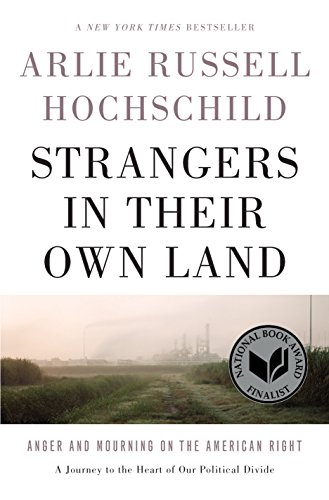Strangers in Their Own Land Summary
<1 min read ⌚
 Anger and Mourning on the American Right: A Journey to the Heart of Our Political Divide
Anger and Mourning on the American Right: A Journey to the Heart of Our Political Divide
The American Dream – unfortunately – is a bit deadish for millions of Americans.
According to Arlie Russell Hochschild, some of them feel like “Strangers in Their Own Land.”
But not for the reasons you would expect.
Who Should Read “Strangers in Their Own Land”? And Why?
As Christopher H. Achen and Larry M. Bartels demonstrated a while ago, unfortunately, elections don’t produce responsive governments even in the most democratic societies.
And the reason is fairly simple: the people who vote don’t really understand what they are voting for.
Since that’s basically the reason why Hochschild wrote “Strangers in Their Own Land,” this is a book which should certainly interest you if you want to understand better the voting psychology of the common man.
However, it will interest you even more if you are a student of sociology or politics, or if you are interested in the nature of the current American society.
Since even more interesting that the reason behind Hochschild writing “Strangers in Their Own Land” are the results of her study.
About Arlie Russell Hochschild
 Arlie Russell Hochschild is an American sociologist and academic.
Arlie Russell Hochschild is an American sociologist and academic.
A Professor Emerita of sociology at the University of California, Berkeley, she has spent decades studying the links between human emotions and moral beliefs as well as private troubles and social issues.
She has authored nine books, few of which – such as “The Managed Heart” and “The Second Shift” – have been either nominated or won important awards.
“Strangers in Their Own Land” was a finalist for the National Book Award.
“Strangers in Their Own Land PDF Summary”
After Mississippi, Louisiana is the second-poorest state in the Union. It is also the one which relies more heavily on federal funding than any other state barring the only one poorer than it.
Interestingly enough, it’s also the country which hands out a greater percentage of “taxpayer money than any other state.”
And that is merely one aspect of the Great Paradox Hochschild discovered while interviewing numerous Louisiana supporters of the conservative Tea Party movement within the Republican Party:
Across the country, red states are poorer and have more teen mothers, more divorce, worse health, more obesity, more trauma-related deaths, more low-birth-weight babies, and lower school enrollment. On average, people in red states die five years earlier than people in blue states. Indeed, the gap in life expectancy between Louisiana (75.7) and Connecticut (80.8) is the same as that between the United States and Nicaragua. Red states suffer more in another highly important but little-known way, one that speaks to the very biological self-interest in health and life: industrial pollution.
In a nutshell, most people living in Louisiana are poor, and many of them die of pollution-related cancer issues, but they still vote for politicians who oppose pollution-related regulations and government aid.
Now, why would they do that?
Why would the country with the highest cancer rates in the United States re-elect Bobby Jindal in a landslide in 2011 even though most of his policies in the previous term had included awarding billions of dollars of incentives to petrochemical industries?
It’s basically like they are paying for their own executions!
Interestingly enough, the big oil companies know and abuse this!
Interviewing one of them, Hochschild has found out that certain towns possess a few qualities which make them the ideal place for the opening of an oil plant.
Populated by long-term residents who are devout Christians lacking education past high school, most of Louisiana’s towns fit the categories perfectly.
In addition to the natural resources, this is the main reason why oil companies settle in Louisiana: it’s difficult to open an oil plant near somebody who understands the risks of pollution. Which means that, as far as the oil companies are concerned, the phenomenal tax-free business opportunities offered by Jindal are basically just a cherry on the top!
Louisiana has profited not one bit of them: in fact, studies have shown that the state has lost more money than it has earned. Not to mention that it has been the site of serious ecological atrocities which have directly claimed the lives of many.
Just consider the aftereffects of the Bayou Corne Sinkhole which was created in 2012 when the Texas Brine company, contrary to government regulations, decided to drill into an underground salt dome and unintentionally drilled through a side wall.
The sinkhole had spread to 37 acres by 2015 releasing toxins all around and necessitating the relocation of the entire community.
All but two members of a family living nearby eventually died from cancer, just like most of their animals. Even the cypress trees suffered the same destiny.
So, why are these people still supporting regulation-free business ventures?
Simply put, the problem is that humans are not “thinking machines which feel,” but “feeling machines which think.” And that, as Jonathan Haidt argues in “The Righteous Mind,” different people have different ideas of what morality actually means.
As we learned from Haidt, the one shared by the blue-collar workers of Louisiana is based on loyalty, authority, and sanctity – things which the liberal media (advocating care and fairness) scoffs at.
However, as Hochschild discovered, the morality of the members of the Tea Party Movement in Louisiana is not something to be scoffed at, but something to be analyzed and understood.
Because it has deep cultural roots that go way back to the American Civil War, which, in the opinion of most Southerners, led to them forcibly changing their ways of life.
And this – in their opinion – happened once again during the Civil Rights Movement which, supposedly, marginalized the white farmers of the South once again.
Most of the interviewed people believe that this has gone on to this very day, regardless of whether it’s about the Southerners’ religion or their preference of American soldiers to Syrian refugees.
Backed by the misrepresentation of FOX News, the election of Barack Obama was merely the icing on the cake: the final piece of the evidence which proved to the citizens of Louisiana that nobody cares for them, even though, being hardworking white citizens, they have been the backbone of the country’s success for centuries.
In layman’s terms, the people of Louisiana hate the government because they think that it gives minorities more rights and opportunities to realize the American Dream than it gives them.
So, in their point of view, they are currently living the way the African-Americans did in the past.
Key Lessons from “Strangers in Their Own Land”
1. Red-State Voters Need the Government More – But They Like It Less
2. The Tea Party Movement Feels That White American Southerners Are Marginalized
3. Partyism Is Officially the New Racism
Red-State Countries Need the Government More – But They Like It Less
You’d expect that the poorer a state is, the more democratic it should be. After all, it’s the Democrats who believe that big businesses have too much money and power and it’s them who advocated and support policies of redistribution of wealth.
However, the very opposite is the case. It seems that the poorer a state is, the more neglected it feels, and (in one of the worst Catch-22 cases) the more inclined it is to support policies which keep its dreadful status quo.
The Tea Party Movement Feels That White American Southerners Are Marginalized
The above is the main reason why most of the people living in Louisiana are not just Republicans, but supporters of the even more conservative Tea Party Movement.
In their opinion, they are strangers in their own land, since the policies of the Federal Government favor women, racial minorities, and immigrants, who “cut in their lines” on their way to achieving the American Dream.
And it is the Dream that (as far as they are concerned) they have established.
Partyism Is Officially the New Racism
Here’s one frightening statistic from this book:
In 1960, when a survey asked American adults whether it would ‘disturb’ them if their child married a member of the other political party, no more than 5 percent of either party answered ‘yes.’ But in 2010, 33 percent of Democrats and 40 percent of Republicans answered ‘yes.’ In fact, partyism, as some call it, now beats race as the source of divisive prejudice.
Like this summary? We’d like to invite you to download our free 12 min app, for more amazing summaries and audiobooks.
“Strangers in Their Own Land Quotes”
The Tea Party was not so much an official political group as a culture, a way of seeing and feeling about a place and its people. Share on X
Louisiana was poor before oil came, and we’re poor today. (Via Dr. Paul Templer). Share on X
One has the police to protect one’s property, Rush Limbaugh to protect one’s pride and God to take care of the rest. Share on X
Louisianans are actually victims, doing emotional work and suffering damages so that we can all have the products of the petrochemical industry. Share on X
Louisianans are sacrificial lambs to the entire American industrial system. Share on X
Our Critical Review
“Strangers in Their Own” is more than a profound insight into the psychology of American right-wing voters. It is also a plea for empathy and understanding.
Which makes this book more than one of the most brilliant sociological studies of the last couple of years.
Namely, an essential read.
Emir is the Head of Marketing at 12min. In his spare time, he loves to meditate and play soccer.


 Anger and Mourning on the American Right: A Journey to the Heart of Our Political Divide
Anger and Mourning on the American Right: A Journey to the Heart of Our Political Divide




